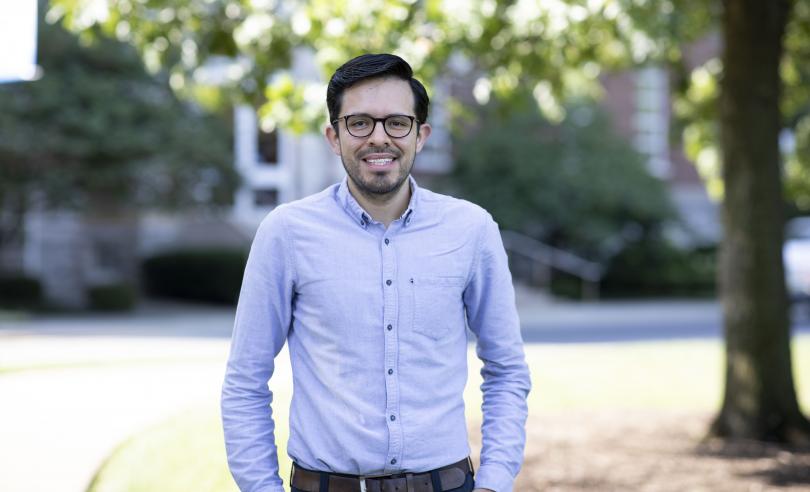By Richard LeComte

LEXINGTON, Ky. -- Just miles from the mansions of Newport, Rhode Island, University of Kentucky anthropologists are helping to unearth a Revolutionary War-era fort that promises to yield artifacts and data about 18th century America.
The site, called Butts Hill Fort, left enough evidence for ground-penetrating radar to pick up an outline of what once were barracks for the British colonial army in 1777, two years after the start of the revolution and a year after the Declaration of Independence.
"This fort was developed in 1777 as a response, primarily by the British,” said Hugo Reyes-Centeno, Ph.D., assistant professor in the Department of Anthropology at UK’s College of Arts and Sciences. "There had been activity by the Continental Army before, but it was the British that really built it up and established barracks for their army.”
Historians knew of the site before thanks to written records and maps, but few archaeologists have conducted work at the site to uncover what lies below the ground today. Using ground-penetrating radar technology, the archaeological team, including Reyes-Centeno, identified some structures below the surface. The team’s findings appear this month in the journal Heritage.
Reyes-Centeno noted that the site, in a built-up area, presents challenges to starting a traditional archaeological dig. For one thing, it’s designated a National Historic Landmark. Here’s where revolutionary technology plays a part.
“We're archaeologists, and traditionally we would go up and dig, but in this case, we couldn't do that, so we asked ourselves how we can explore the site in a nondestructive, non-invasive way?” he said. “There's great technology nowadays that allows us to do that."
First, the team found where the barracks once stood using satellite and aerial imagery from the site superimposed on historical maps, he said. The archaeologist team, which included students and staff from UK and Stonehill College in Easton, Massachusetts. The team collected data with a GPR device to detect signals of the barracks underground using methods being tested at UK’s heritage science EduceLab.
“We found clear signals around the perimeter of where the barracks building once stood and possibly signals of the building’s chimneys,” he said.
The archaeologist team worked with members of the Battle of Rhode Island Association in Portsmouth, including study co-author Paul R. Murphy, a U.S. Air Force veteran and chair of the Butts Hill Fort Restoration Committee, as well as military historian and study co-author John K. Robertson, emeritus professor of geography and computer science at the U.S. Military Academy in West Point, N.Y. Lead author of the article is James Keppeler, a doctoral candidate in anthropology at UK. The work was completed during a historical archaeology field school for undergraduate students, some of whom were funded by the National Science Foundation’s Research Experiences for Undergraduates program through EduceLab.
"It was a great opportunity for students to apply advanced archaeological skills while helping the community — and country — learn more about this important heritage site,” said Alexandra Uhl, co-principal investigator and senior co-author at Stonehill.
Part of the funding for the exploration came from the National Endowment for the Humanities’ Celebrate America program. The next steps involve additional humanities work analyzing historical records, as well as scientific work analyzing newly collected ground-penetrating radar imaging. In the future, it might also involve digging at the site to learn more about the use of the fort by not only the British, but also their German allies and the French occupants allied with the Americans.
“It is exciting and meaningful to be a part of the mission to revitalize the fort site,” Keppeler said. “I look forward to seeing how it is commemorated for the upcoming celebration of the nation’s 250th anniversary.”
Digital Humanities of the American Revolution fortification at Butts Hill (Portsmouth, Rhode Island) has been made possible in part by a major grant from the National Endowment for the Humanities: Democracy demands wisdom. Any views, findings, conclusions, or recommendations expressed in this article do not necessarily represent those of the National Endowment for the Humanities.
